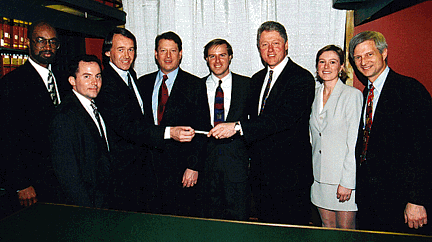 Verizon Wireless is contemplating the end of flat rate, unlimited data plans as it introduces fourth generation data networks this year.
Verizon Wireless is contemplating the end of flat rate, unlimited data plans as it introduces fourth generation data networks this year.
“We will probably need to change the design of our pricing where it will not be totally unlimited, flat rate,” John Killian, chief financial officer of Verizon Communications Inc., the wireless unit’s parent, said in an interview at Bloomberg’s headquarters in New York.
Verizon expects “explosions in data traffic” as the company introduces customers to its 4G network, potentially ten times faster than older mobile broadband technology. Verizon Wireless, already capturing enormous sums of revenue from consumers forced into mandatory, expensive data plans when they upgrade to smartphones, will soon discover some serious limits on those plans.
The irony is, Verizon’s 4G upgrade will bring wireless broadband speeds to consumers they realistically cannot use for much more than web browsing, e-mail, and low-bandwidth apps. Video downloads will burn through data limits imposed at the level AT&T introduced for its customers earlier this month.
Wall Street wants consumers re-educated to believe broadband can never be unlimited and must be treated as a precious, limited resource.
“The more bandwidth that you make available, the faster it will be consumed,” said Craig Moffett, analyst at Sanford C. Bernstein & Co. in New York. “From Verizon’s perspective, the last thing you want is for another generation of consumers to be conditioned to the idea that data is always going to be uncapped.”
Moffett’s clients hope that is true because usage limits will control costs and make customers think twice about using their data features on their phones. Reduced demand equals increased revenue, just what Wall Street ordered.
Verizon Wireless has already set the stage for that increased revenue with mandatory add-on plans that boost customer bills, especially for those buying smartphones. Although just 17 percent of Americans own smartphones today, Verizon predicts 70-80 percent of customers will upgrade to smartphones in the next few years. That guarantees an “upgraded” bill as well.
Estimates about current average data usage from smartphone customers ranges from 200-600 megabytes per month, but that was before the arrival of video-friendly 4G network technology and the newest generation of phones optimized for video, which can easily consume ten times as much.
Verizon recognizes the “video threat,” and press reports suggest the limits will only be imposed on the 4G network. Current generation 3G networks make viewing video tedious, a natural barrier for customers planning to “use too much.”
Verizon’s widely anticipated limits, almost certainly to be equivalent to AT&T’s with respect to allowances and pricing, may dampen enthusiasm for the iPhone on Verizon’s network. Any existing AT&T customer is grandfathered into unlimited data plans for their smartphones. If those customers leave AT&T, they will be forced to take a usage-capped data plan from Verizon with no looking back. AT&T won’t provide unlimited plans for customers returning to their fold.


 Subscribe
Subscribe






